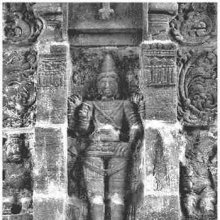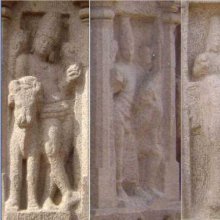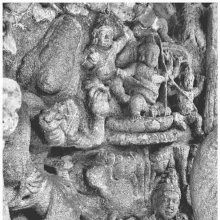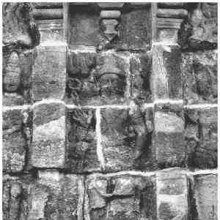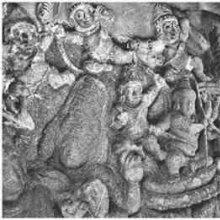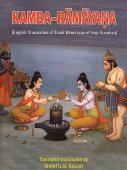Skanda, Skānda, Skandā, Skamda: 32 definitions
Introduction:
Skanda means something in Buddhism, Pali, Hinduism, Sanskrit, Jainism, Prakrit, the history of ancient India. If you want to know the exact meaning, history, etymology or English translation of this term then check out the descriptions on this page. Add your comment or reference to a book if you want to contribute to this summary article.
Skanda has 32 English definitions available.
Images (photo gallery)
(+12 more images available)
Languages of India and abroad
Sanskrit dictionary
[Deutsch Wörterbuch]
Source: Cologne Digital Sanskrit Dictionaries: Böhtlingk and Roth Grosses Petersburger WörterbuchSkanda (स्कन्द):—(von skand) m.
1) das Verschüttet-, Verspritztwerden: askandāya [The Śatapathabrāhmaṇa 13, 1, 3, 1.] [Taittirīyasaṃhitā 1, 5, 8, 5.] retasaḥ [5, 6, 8, 4.] ghrāṇa so v. a. das Schnäuzen der Nase (Grunzen in den Nachträgen) [Rājataraṅgiṇī 5, 417.] —
2) das Zunichtewerden: aśubhaskandāya [Gītagovinda 7, 42.] —
3) Quecksilber (wegen seiner Beweglichkeit) [Rājanirghaṇṭa 13, 112.] —
4) der Ueberfaller personif. als Heerführer der Götter und als Haupt der Kinder-befallenden Krankheitsdämonen; gilt als der ewig jung bleibende (vgl. kumāra, sanatkumāra) Sohn Śiva’s (auch eines Rudra) oder Agni's, der von den Kṛttikā (daher auch kārttikeya genannt) auferzogen wurde. [Amarakoṣa.1,1,1,35.] [Hemacandra’s Abhidhānacintāmaṇi 208.] [Halāyudha.1,19.] [Patañjali] zu [Pāṇini’s acht Bücher.5,3,99.] [Chāndogyopaniṣad.7,26,2.] [ŚATAR.] in [Weber’s Indische Studien.2,44.] [Anukramaṇikā des Atharvaveda zu 31.] [Bhagavadgītā 10,24.] [Mahābhārata.1,8265.3,14337. fg. 7,7837.] [Harivaṃśa 44. 158. 7219.] [Rāmāyaṇa.2,25,10.] [Meghadūta 44.] [Raghuvaṃśa.2,36.7,1.] [Varāhamihira’s Bṛhajjātaka S. 43,45. 52. 46,11. 48,26. 58,41.] [Lassen’s Anthologie (III) 88,5. 92,13.] [Kathāsaritsāgara 7,9.] [Viṣṇupurāṇa 59.] [Mārkāṇḍeyapurāṇa 52,11.] [WEBER, KṚṢṆAJ. 247. 252. 268. 310.] [Rājataraṅgiṇī.6,137.] [Oxforder Handschriften 25,b,22. 27,a,36. 42,a,14. 46.a,45. 69,b,20. 73,a, No. 125. 269,a,31] (als Sprecher im Skandapurāṇa: vgl. [42).] [Bhāgavatapurāṇa 6, 6, 14] (fehlerhaft skandha bei [BURN.][?). WILSON. Sel. Works 2, 22. Rgva tch’er rol pa ed. Calc. 137, 6.] skandotpatti [Mahābhārata 3, Adhy. 222. fgg.] [Weber’s Verzeichniss No. 485.] Etymologie des Namens [Mahābhārata 3, 14315. 13. 4099.] [Rāmāyaṇa 1, 38, 27 (39, 27 Gorresio).] als Krankheitsdämon (vgl. graha) [Mahābhārata.3,14387. fgg.] [Suśruta.2,385. 2. 394,9. 15.] [Śārṅgadhara SAṂH.1,7,109.] [Oxforder Handschriften 307,b,25.] viśākhau gaṇa dadhipayaādi zu [Pāṇini’s acht Bücher 2, 2, 14.] neutr. ungenau für skānda (sc. purāṇa) [Mārkāṇḍeyapurāṇa S. 659,] [Śloka 3.] [Oxforder Handschriften.8,a,3]; vgl. skandākhyam (so ist zu lesen) [80,a,2.] —
5) Nomen proprium eines Mannes gaṇa kuñjādi zu [Pāṇini’s acht Bücher.4,1,98.] pl. [SAṂSK. K. 186,a,11. -] [Weber’s Indische Studien.3,280] ist skānda wohl die richtigere Lesart. —
6) Körper [Trikāṇḍaśeṣa 2, 6, 19.] —
7) Fürst [Jaṭādhara im Śabdakalpadruma] —
8) Flussufer und Gelehrter [ŚABDĀRTHAK.] bei [WILSON.] — Vgl. tṛṇa, nīla, madhu, rudra, śiva, skānda fgg. und skandha .
--- OR ---
Skānda (स्कान्द):—
1) adj. von Skanda herrührend u. s. w.: vacas [SARVADARŚANAS. 72, 2.] purāṇa oder n. mit Ergänzung dieses Wortes [?13. Viṣṇupurāṇa XLV, Nalopākhyāna 70. 284. WEBER, KṚṢṆAJ. 221. fgg. Rāmatāpanīya Upaniṣad 332. Weber’s Indische Studien.1,18,9. Weber’s Verzeichniss 127, Nalopākhyāna 1. Oxforder Handschriften 59,a,39. 65,a,43. 108,a, No. 168. 113,b,48. 126,a,23. 249,a,19. 252,a,12. 279,b,46. 284,b,23.] — —
2) adj. von Skandasvāmin herrührend: bhāṣya [MÜLLER, SL. 240.] —
3) m. fehlerhaft für skanda (so ed. Bomb.) [Mahābhārata 13, 2013.]
Sanskrit, also spelled संस्कृतम् (saṃskṛtam), is an ancient language of India commonly seen as the grandmother of the Indo-European language family (even English!). Closely allied with Prakrit and Pali, Sanskrit is more exhaustive in both grammar and terms and has the most extensive collection of literature in the world, greatly surpassing its sister-languages Greek and Latin.
See also (Relevant definitions)
Starts with (+54): Skandabhashya, Skandabhata, Skandabhatta, Skandacarita, Skandacharita, Skandadasa, Skandagni, Skandagraha, Skandagupta, Skandaguru, Skandaja, Skandajanani, Skandajit, Skandaka, Skandakacarya, Skandakagrama, Skandakanta, Skandakatha, Skandakavaca, Skandakoti.
Ends with (+18): Abaraskanda, Abhiskanda, Abhyavaskanda, Anuskanda, Apariskanda, Askanda, Avaskanda, Ayaskanda, Bhenskanda, Dadhiskanda, Dhanushkanda, Dhiraskanda, Dirghaskanda, Ghanaskanda, Ghranaskanda, Godhaskanda, Kalaskanda, Kartapraskanda, Madhuskanda, Mahaskanda.
Full-text (+1754): Karttikeya, Mahishardana, Devasenapati, Gajashiras, Skandaputra, Tuhara, Pakshalika, Cakranemi, Manikuttika, Meghasvana, Amitashana, Gitapriya, Nrityapriya, Skandajit, Diptavarna, Tarakantaka, Kumara, Harasunu, Skandabhashya, Aishi.
Relevant text
Search found 133 books and stories containing Skanda, Skānda, Skandā, Skamda, Skaṃda; (plurals include: Skandas, Skāndas, Skandās, Skamdas, Skaṃdas). You can also click to the full overview containing English textual excerpts. Below are direct links for the most relevant articles:
Historical Elements in the Matsya Purana (by Chaitali Kadia)
Name of the Purāṇas < [Chapter 1 - An Introduction of the Purāṇas]
Classification of the Purāṇas < [Chapter 1 - An Introduction of the Purāṇas]
Characteristics of Purāṇa < [Chapter 1 - An Introduction of the Purāṇas]
Amarakoshodghatana of Kshirasvamin (study) (by A. Yamuna Devi)
The Markandeya Purana (Study) (by Chandamita Bhattacharya)
The Vishnu Purana (by Horace Hayman Wilson)
13. The Skanda Purāṇa < [Preface]
Classification of the Purāṇas < [Preface]
Chapter VI - Account of the different hells, or divisions of Naraka < [Book II]
Shrimad Bhagavad-gita (by Narayana Gosvami)
Verse 10.24 < [Chapter 10 - Vibhūti-yoga (appreciating the opulences of the Supreme Lord)]
Verse 2.69 < [Chapter 2 - Sāṅkhya-yoga (Yoga through distinguishing the Soul from the Body)]
Verse 9.14 < [Chapter 9 - Rāja-guhya-yoga (Yoga through the most Confidential Knowledge)]
Srila Gurudeva (The Supreme Treasure) (by Swami Bhaktivedanta Madhava Maharaja)
Types of Evidences according to Śrī Madhvācārya < [Chapter 1.5 - Back to Home Village]
Be careful of the first Offence in Chanting < [Chapter 1.2 - Śrīla Gurudeva’s Pūrvāśrama]
A visit from Parents < [Chapter 1.6 - Return to Maṭha Life]
Related products
